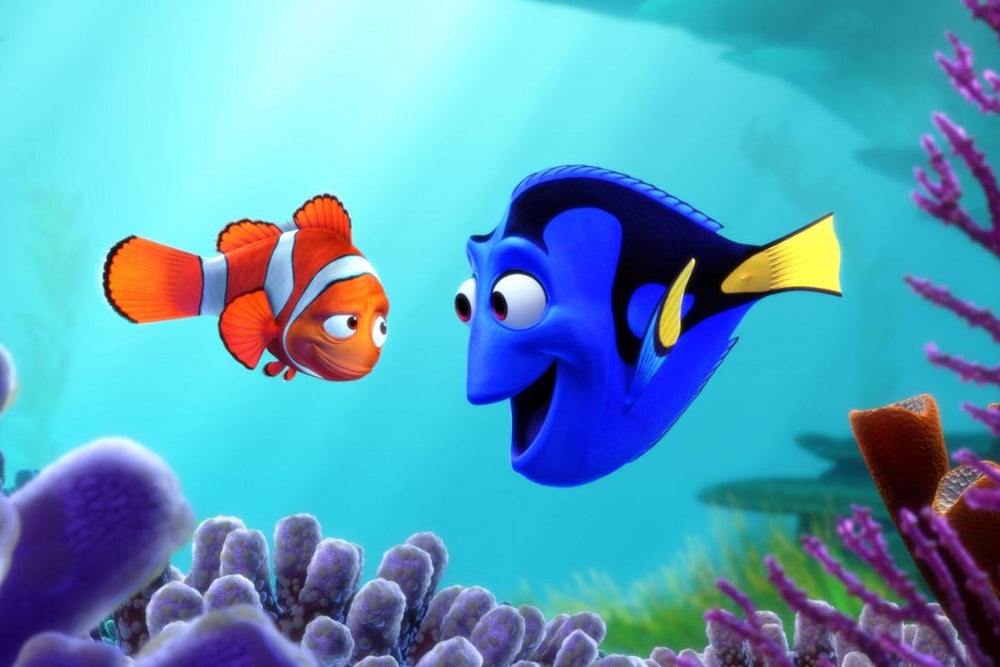Finding Dory is perhaps the most conventional movie Pixar has made. It’s a film that does everything well but nothing spectacularly, like a greatest hits of Pixar’s ample strengths and occasional weaknesses. It’s a sequel that’s a continuation of the original film rather than an expansion of it, and while doesn’t have near the ambition of the original Finding Nemo, let alone the grand achievement of Wall-E, it is still a success, thought not a triumph.
Pixar has provided us unusually intelligent and emotional all-ages entertainment nearly every year for more than two decades. Even their worst movie, widely considered to be Cars 2—though I’ll make the case for it—has light years more going on than Minions. Finding Dory gets dinged for being a traditional sequel, but no one does a traditional sequel as well as Pixar does. The film is charming, funny, and exciting, which is more than enough to make up for its lack of transcendence. Finding Dory is still Pixar, and it’ll still get to you.
The movies take something that was flippantly used as a joke in the first film and turns it into something sad and wistful—Dory’s short-term memory. In a way, it’s a quiet commentary on the first film. We meet Dory (Ellen Degeneres, who’s perfect in these films) as a child, with parents (Diane Keaton and Eugene Levy) who realize, with her memory loss, they essentially have a child with special needs. It’s a smart twist on the original’s theme of parents being afraid to trust their children in the terrifying outside world; in their case, Dory has a legitimate, potentially perilous affliction, and they do everything they can to arm and protect her. (I suspect parents of children with special needs will be particularly moved by this film.) They do end up losing young Dory, can’t remember where she’s going or who she has lost, and we see years go by until we reach the events of the first film, when she meets Marlin (Albert Brooks) and makes her first real friend. After that film’s plot ends, Dory begins to recover memories of her parents and sets out to reunite with them. In this film, it’s the title character who is doing the finding.
Centering the movie around Dory is a risk. Comic-relief characters, as she was wonderfully in the first film, are always at danger of overstaying their welcome when given their own close-up. But the sequel burrows deeper into her personality, particularly her disability, ultimately arguing that what might seem like a weakness is actually a strength. Dory is deeply good-hearted, and the movie is most effective when she’s either at the center of the action or inspiring others to move it forward. Her interaction with her family, and the revelations she has about herself and everything she’s capable of, are the film’s and driving force. Unfortunately, the plot is shakier, and a little more manic, than you typically see in a Pixar film. One of the charms of Finding Nemo was that it took place entirely in the ocean. Humans couldn’t see or understand the undersea world and thus we could be fully invested in it. Here, the crossover is sloppier: In a ridiculous scene, our heroes hijack a truck and drive it down the freeway. I realize saying that something in a movie about talking fish is “unbelievable” is stupid, but the scene—played for broader slapstick than you’ll like—is indicative of the willingness of this sequel to cut more corners than the original. I’ll buy that a humpback whale and a clownfish can be best friends, but you lost me when the octopus is able to operate a manual transmission, I don’t care how many tentacles he has.
The whole film’s a little more madcap than necessary, a little too overeager to keep hurtling forward. You almost want it to slow down and focus on Dory, whose plight is powerful, relatable, and poignant. The movie is, in its purest sense, an expertly executed sequel, a reminder of what you liked about the first film without feeling like a straight remake. It’s grand entertainment, but it’s average Pixar.
Grade: B
To hear more movie reviews from Tim Grierson and Will Leitch, explore their weekly podcast with the New Republic:
Grierson & Leitch write about the movies regularly for the New Republic and host a podcast on film, Grierson & Leitch. Follow them on Twitter @griersonleitch or visit their site griersonleitch.com.
